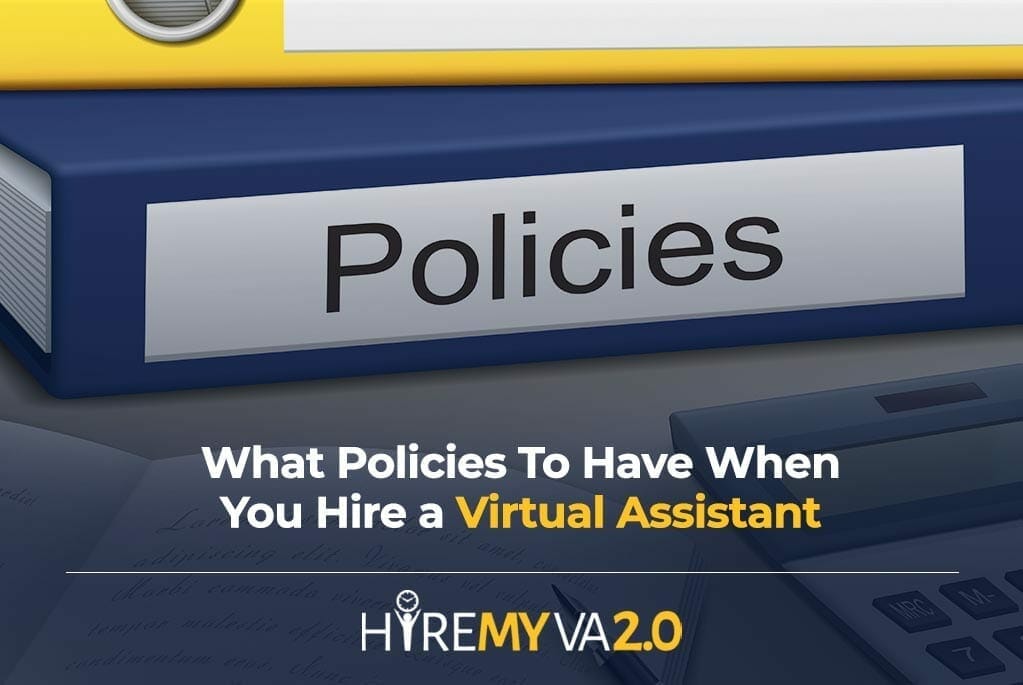You’ve finally taken the leap and decided to hire a virtual assistant to help you get some more time in your life, more freedom.
And maybe to offload tasks that either someone else can do better or faster.
But are there some things you need to have in place to help guide them (and you) once they are on board?
Documents? Training? Guidelines?
What should you have to help you establish some boundaries, to help govern the relationship?
In our community, we teach that you should have several things in place upfront, such as:
- Mission
- Vision
- Core Values
Those help guide you in not only attracting the right people to your organization but how you and they will act within it.
Another piece that’s often overlooked by entrepreneurs, but established in most companies, are some policies and procedures.
Ugh, that sounds so boring, right?
Yeah, it can be, so let’s set some perspective.
Policies and Procedures – Why?
The dictionary defines a policy as “a definite course of action adopted for the sake of expediency, facility, etc.”
Boom!
Do you see the hidden gem in that definition? Why you need them and want to have them?
EXPEDIENCY!!
You want to get more done in less time, right?
You want to save your energy so you can use it where it’s needed most, correct?
So don’t look at policies and procedures as something dreaded, to restrict you, to stifle you, to put a drag on your business that you want to see take off.
Because in reality, they can actually help you gain freedom by saving you time and energy, and help you to produce consistent quality.
So what’s not to like?
Let’s look at the policies you really should have to get started with team members, or if you have them, to introduce.
Which Policies do you need to get started?
The procedures themselves, for your business, will depend upon your business, but several generic policies are needed by you when you hire someone no matter what your business, either for-profit or not-for-profit. At a minimum, you’ll need
- a Password policy
- a Paid Personal Leave, Holidays, and Working Time Expectations Policy
- a calculator for the above
We’ve written starter policies based upon what we use in our businesses and consulting with other companies that you can get when you join our community, but let’s briefly touch on what each should have in them.
And there are others you should have in your business that will help such as a Referral Policy and a Discount Policy for Family and Friends.
Sections for each Policy
- The Why behind the policy. If you can’t explain the why behind it, don’t do it! In fact, there needs to be a Why behind everything you do in life! For example, why do I exercise? Because it gives me MORE energy, helps me feel better, and lets me eat more!
- The Policy details itself.
- Exceptions that would cause the policy to be “skipped” or modified for a particular situation. Normally we put something like “none” or “any exceptions to this policy must be approved by the CEO in writing” or “any exceptions to this policy must be agreed upon by the CEO and CFO and COO”.
- Revision History so that when you make an update, your team knows what changed and doesn’t have to read everything in it again.
Password Policy
Password policy is needed for the protection of your assets and your business itself.
And it’s really needed whether or not you hire someone because most likely you’ll need access to certain software or information specifically related to your client’s assets.
The Password policy should give specifics on
- The uniqueness of a password, such as a number of characters and the types of characters. You yourself, or allowing a team member, to have a password of “password123” can spell disaster!
- Where the passwords are to be stored such as the password manager that your company uses, or if you give them flexibility to choose their own manager.
- Accounts that are established if you’re using something common as a team.
- Where to generate the password.
Paid Personal Leave, Holidays, and Working Time Expectations Policy
The Paid Personal Leave, Holidays, and Working Time Expectations Policy help team members know the boundaries of their personal leave that’s paid by you.
Paid Personal Leave, Holidays, and Working Time Expectations Policy should give specifics on at least
- the years of service and what they earn on a yearly or monthly or weekly basis, and at important junctures of their service (like 5 years, 10 years, etc.)
- the rules of scheduling, meaning how far in advance they should request time off
- how to request time off
- holidays you give and what happens when they fall on a weekend
expected working times - if they can’t work their times, how they are to notify you
- if they can actually work a holiday and what happens
Also needed is a way for you to calculate the earned time and to track what they take. This should automatically do it for you and adjust over time as they earn more hours.
On a side note, we don’t recommend unlimited vacation as some companies provide. We feel it’s not healthy for our team members because it leads to NOT taking vacations and can limit the accountability provided by tracking numbers such as sick time.
Final Thoughts
Policies are important for safety, communication, and expediency, saving you time and money and effort when established properly.
Again, for those in our community, we’ve written starter policies (and the mentioned calculator) when you signup, and we’re morphing them as we learn more and as we get input from the community.
So get those policies going to help you and your business THRIVE!

